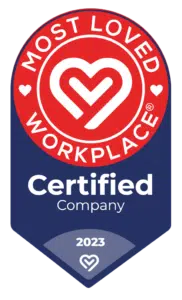Top 10 Workplace Survey Questions For Enhanced Employee Engagement
Employee engagement is the cornerstone of a vibrant and productive workplace. Unlocking your team’s full potential, increasing job satisfaction, and ultimately improving workplace morale all hinge on understanding and addressing employee engagement. It is essential to recognize the critical role employee engagement plays and the significance of workplace surveys in achieving it.
We have researched to compile a list of the top 10 workplace survey questions that can effectively gauge employee engagement and overall satisfaction.
Table of Contents
“On A Scale From 1 To 10, How Satisfied Are You With Your Current Role?”
This straightforward question provides a fundamental measure of employee satisfaction. Understanding your employees’ job satisfaction is a foundational step in improving their work experience. A high satisfaction score indicates that employees find their work fulfilling and meaningful, whereas lower scores can signal areas that need attention.
A deeper understanding can be achieved by breaking this question down into aspects like workload, job responsibilities, or work-life balance. This segmentation provides a comprehensive view of the factors contributing to satisfaction, enabling you to fine-tune engagement strategies.
“Do You Feel Your Contributions Are Recognized And Appreciated By Your Superiors?”
Employee recognition is a pivotal element of engagement. When employees feel recognized and appreciated, it fosters a positive emotional response, increasing motivation and commitment. Recognizing employee contributions is not just about praise but also about fulfilling a fundamental psychological need.
Surveys focusing on recognition provide insights into the effectiveness of existing recognition programs and practices. They can also uncover specific ways employees prefer to be recognized, whether through praise from superiors, peer recognition, or tangible rewards.
“Are You Clear About Your Career Growth And Development Opportunities Within The Organization?”
Clear career development paths are crucial for maintaining employee engagement. When employees have a clear vision of their potential career paths within the organization, they are more likely to stay motivated and committed. This question evaluates whether employees feel the organization is invested in their long-term development.
Effective communication about growth opportunities is also essential. Informed employees are engaged employees. The responses to this question offer valuable insights into the effectiveness of communication and the availability of growth opportunities.

Building a Thriving Workplace Culture!
Discover how to leverage the right technology and implement a proactive strategy that cultivates talent and facilitates team collaboration.
“How Well Does Your Immediate Supervisor/Manager Support Your Professional Growth?”
The relationship between employees and their managers is paramount. Supportive managers are critical drivers of employee engagement. This question helps identify areas for improvement in leadership and mentorship.
Effective managers foster open communication, provide regular feedback, and make employees comfortable discussing their career aspirations. Gathering feedback through this survey question helps organizations pinpoint areas where managerial support may be lacking.
“Is The Company Culture Aligned With Your Values And Beliefs?”
Cultural alignment is a potent driver of employee engagement. When employees feel that the organization’s values and culture resonate with their own, they are likelier to connect on a deeper level. This alignment creates a sense of belonging and purpose, which are essential for engagement.
This question delves into whether the company culture aligns with employees’ values and beliefs. Responses provide a clear picture of cultural alignment and can guide organizations in shaping their culture to align with their employees’ values.
“Do You Feel Comfortable Providing Feedback Or Suggestions For Improvements?”
Open communication is essential for engagement. This question evaluates whether employees have adequate channels for providing feedback, which is critical for making them feel heard and valued.
“How Well Do Your Job Responsibilities Align With Your Skills And Strengths?”
Matching job roles to employees’ skills and strengths is crucial for job satisfaction. This question identifies areas where adjustments can be made to enhance employee engagement.
“Are You Satisfied With The Work-Life Balance Provided By The Company?”
Work-life balance directly impacts employee morale. This question assesses whether the organization’s approach to work-life balance is practical and aligns with employee needs.
“Do You Have Access To The Necessary Tools And Resources To Perform Your Job Efficiently?”
Providing employees with the resources they need to perform their jobs efficiently is a fundamental aspect of engagement. This question helps organizations evaluate whether they are adequately equipping their employees.
“How Likely Are You To Recommend Our Company As A Great Place To Work?”
Engaged employees are likelier to recommend their organization as a great workplace. This question assesses employees’ willingness to promote their organization to others.
Leveraging Employee Engagement Survey Data
Collecting survey data using these questions is just the first step. It’s essential to take meaningful actions based on the responses:
- Analyze and Identify Areas for Improvement: Examine the survey results to identify patterns and areas where employee engagement may be low. It could be specific departments, teams, or aspects of company culture.
- Create an Action Plan: Develop a clear plan to address the identified areas for improvement. Assign responsibilities and set specific goals to enhance employee engagement.
- Implement Changes: Take action based on the insights gained from the survey. It may involve changes in management practices, additional training, or adjustments to company policies.
- Regularly Reassess: Employee engagement is an ongoing process. Regularly conduct surveys to track progress and make further improvements.
Final Word
Employee engagement is a cornerstone of a thriving workplace, and Workplacely recognizes its significance. The top 10 survey questions offer genuine value by uncovering crucial insights based on real data and research. They serve as a tool for organizations to assess and enhance employee engagement effectively.
Workplacely’s role is to facilitate the survey process, supported by robust analytics. By using these questions, organizations can take informed actions, fostering high morale, job satisfaction, and productivity in an environment where employees are deeply engaged and committed to the organization’s mission.



0 Comments